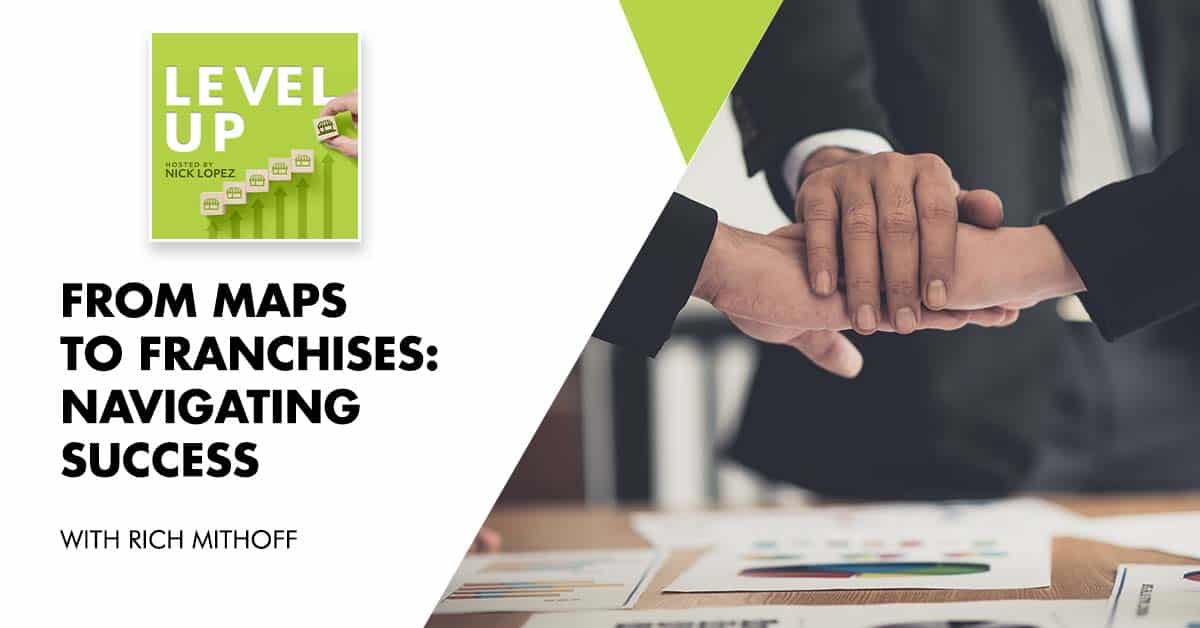
Are you ready to fire your boss and hire yourself? Join Nick Lopez, founder and steward of LIME Painting, on “The Level Up Show,” where entrepreneurship meets empowerment. Nick, a self-proclaimed “crazy entrepreneur” with over 16 years of experience, shares his journey of taking the arrows in the back and thriving in the world of franchising.
In this episode, Nick and his guest, Rich Mithoff, delve into the paths of building successful careers and delivering impactful solutions. They discuss the crucial steps for aspiring entrepreneurs, from understanding your territory to aligning with a supportive franchise culture. Rich emphasizes the importance of being passionate, doing your due diligence, and embracing the leap of faith necessary for success. Nick celebrates the entrepreneurial spirit, highlighting the rewards of creating local impact, advancing careers, and serving clients. Whether you’re contemplating leaving your cubicle or actively seeking the right franchise opportunity, this podcast offers valuable insights and motivation to pursue your American dream.
Tune in to learn how to navigate the franchise landscape, avoid common pitfalls, and enjoy the process of entrepreneurship. “The Level Up Show” is your go-to resource for transforming aspirations into reality. Don’t miss out—level up with Nick Lopez today!
—
Watch the episode here
Listen to the episode here
Powered by Podetize
From Maps To Franchises: Navigating Success With Rich Mithoff
Welcome to the show where we have the absolute pleasure of learning from thought leaders in business, franchising, and high-performance personal development. I am very excited for this guest. He most certainly goes without exception, Rich from Atlas Franchise Group.
‐‐‐
Welcome to the show.
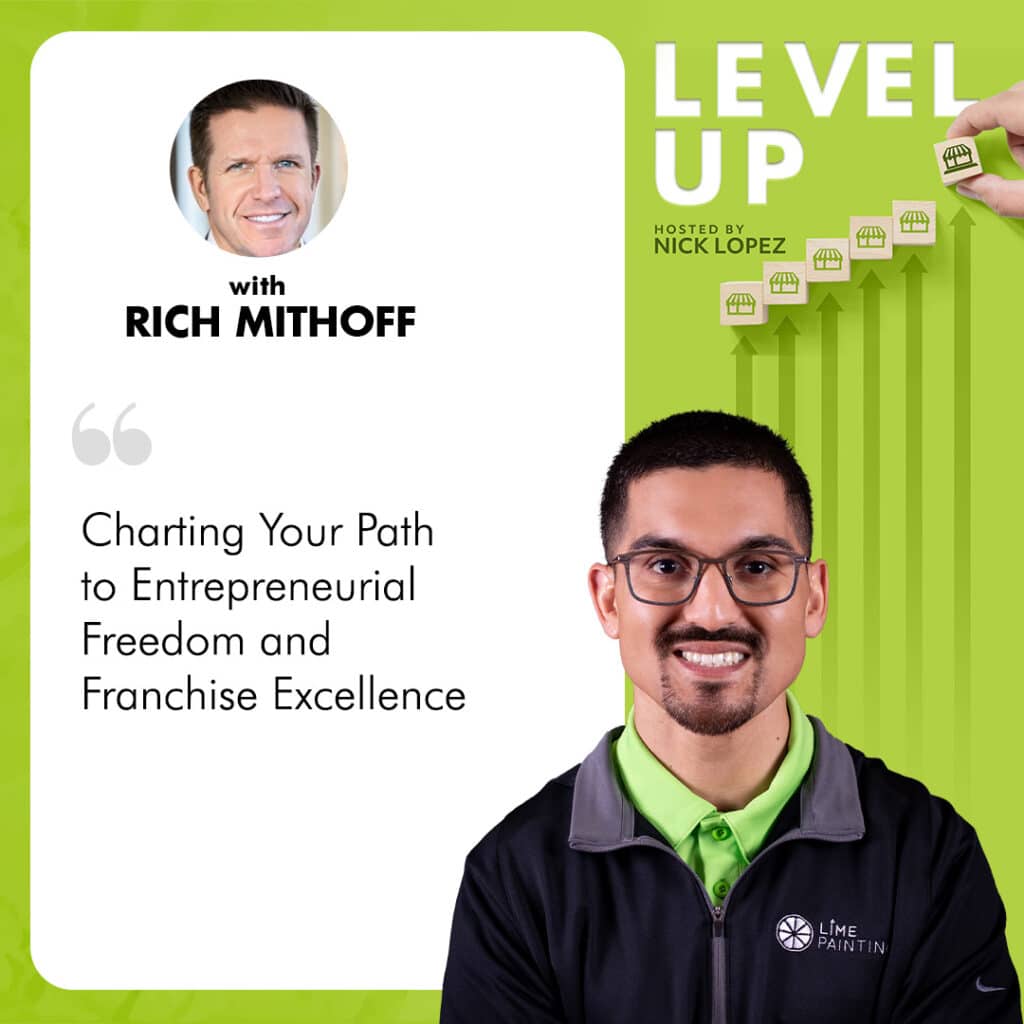
Thank you. I appreciate it. Thanks for the introduction. I’m glad to be here.
Looking Back
Most folks think of franchising as quick service restaurants like Burger King and McDonald’s. How is a painting company a franchise? Plenty of other companies, if the business provides value, is ethical, and makes money, can be franchised. That’s anything under the sun. Nobody says, “I’m going to get into franchising.” At least I didn’t. Would you mind sharing how franchising found you?
Sure. I’m right there with you. I never really looked for franchising. It found me. I studied Geography in college. For my first job out of college, I was working for AAA updating the roadmaps. I realized, “This isn’t a sustainable revenue stream for me. It’s not going to be an easy way to start a family and bring in the income that I need.”
I found a sales job where I was selling mapping software and demographics. It really fit my niche. I enjoyed working with maps and working with data. Along the way, I found that franchise groups need territory maps, and they need to be able to map successful territories based on demographic data. I did that for the better part of two decades.
A couple of years ago, my wife and I were looking at what we were doing. She was a teacher and I was selling mapping software. We decided, “I really enjoy working with franchises and helping people along the way make the right decisions.” We both decided, “Let’s jump into the franchise consulting business and help people realize that dream.” A year and a half later, here we are, and we’re loving every minute of it.
You said you went to school for geography. That is incredible. Franchising has a way of finding you. Could that not be more true with your journey?
Yeah. I had no idea going to school. I knew I wanted to work with maps in some form. I realized that on the sales side, you can be a little bit more successful in terms of income opportunities and then helping people. I was selling and supporting that mapping software and then finding some of my best clients were franchisors. It went from there.
Franchising
What was it that was special about franchising that stood out? Clearly, it stood out.
It did. It seemed like a no-brainer. You’ve got a path to success. If you follow that path, your odds of success are so much higher. When I’d help people with their territories, a lot of times, they’d tap me on the shoulder and be like, “Rich, can you build out the Denver market? Can you build out the Southern California market?” I’d help them out with that. I’d ask, “Who’s in this territory? How are they doing? How are they performing? How long did it take in the ramp-up?” I’d hear these stories and I’m like, “I want to be more of a part of this.”
What were some of the initial impressions about franchising that made it clear that this is a path that somebody can realize entrepreneurship?
The most common denominator for this was people who are on the franchise side want their franchisees to be successful. Not only are they sure they’re going to be generated a royalty from that franchise or that territory, but ultimately, it’s like, “Let’s create the most optimal territory for our franchisees. Let’s provide them with the service and support to get started.”
It seemed like they had more of an interest in the success of their franchisees even though they weren’t employees. They’re more business partners, but you could always see that commonality where they wanted to make sure that their franchisees were successful. That’s really where it took off from there. It’s like, “This is an industry I can get behind and participate in.”
You like the community element and the support piece. What was impressionable? Why did that come off as something that clearly made a mark on you?
Probably the relationships that I had with my clients. I’m always trying to build that trust factor, have integrity, and make sure that I’m providing the best service that I can. I see that they were doing the same on their end. I’ve worked for other companies as well that aren’t in the franchise space. You don’t see it as frequently. You’re going to see that as well, but a lot of times, it is more of that dog-eat-dog mentality where it’s like, “Let’s close that next deal and move on to the next opportunity.” In franchising, it’s a longer-term relationship. It’s teamwork. It’s success in the whole system. If you bring on the wrong franchisee or sell the franchisee the wrong territory, then that’s where things can go sideways.
There’s that common mutual alignment in a franchise system where folks are in business together. They’re not in business for themselves. They’re growing enterprise value collectively and collaborating around innovating and adopting the model and sharing best practices around the winning formula. That is a cheat code.
I agree. You’re setting that person up for success. They’ve already ironed out the kinks. A cheat code is a good way to describe it.
Clearly, this collaborative business relationship was different and it stood out. it made an impression, in fact, enough of an impression, for you to help people navigate all of the franchise opportunities. You were working in the territory mapping space as a supplier, B2B there with franchisors. You were able to look behind the curtain and see this amazing space that creates opportunities, impacts communities, and develops folks’ careers.
The winning playbook is that, a path to building a career and a path to delivering a solution to a need in the market. That could be a product or a service. You name it. We talked about all the options that could be franchised, and it’s anything. Franchising is a growth model and creates incredible synergy across all of the individual outlets that they’re all owners in the business. That is a unique model. Frankly, being a franchisor and a founder, that’s exactly what drew me to the franchise model. There’s some commonality there. Clearly, that is what is one of the greatest advantages or the cheat code behind the franchise model.
Something that stood out as you were talking was this whole aspect of support. It isn’t transactional, which in business and the marketplace, it can be easy for it to become transactional. Even within the same company, you’re talking about growth in your traditional corporate structure that can be very transactional. Franchising creates independent ownership at leadership levels all across the organization. That’s a pretty unique aspect of the franchise model.
You hit the nail on the head. That’s probably a good way to explain or prove that the numbers don’t lie. You’re not guaranteed to succeed, but your chances of success are significantly higher.
Franchise Consulting Career
You join a system and a cohort and the cohort tells you, “I wish I knew this. I wish I did that. I messed up here.” They immediately cheat codes and enhance what is already the playbook that they’re going through. You throw in the cheat code of a franchise, which is the collective ownership group, the collaboration. That is incredible. You are a supplier and ultimately are able to look into the franchise business. It was exciting. It moved you and inspired you to start your franchise consulting career, and your business in doing that. You are a guide for all of these franchise options in the marketplace. Is it fair to say you’re like a matchmaker?
Yeah. I would say that. That’s how we put the thought into naming the business as well. Atlas is a book of maps. I have a mapping background. Those maps provide guidance. They show you where things are. I have a portfolio of franchises that I can help guide people with and put them in the right location based on what their needs are.
There are how many options of franchises out there in the market?
There are thousands. It’s crazy.
If I’m somebody who is working in a company that is experiencing that transactional environment and wants freedom and independence and wants to realize their American dream through entrepreneurship, a lot of folks stay in that state. They think about it. They never really take action and pursue it. That’s a special individual.
Somebody who ultimately fires their boss turns away from Corporate America and hires himself. He goes into business as a franchise owner. In doing that, you’re like, “Why would I invest in a franchise?” It takes years to develop a winning playbook, not to mention the fact that a franchise is going to put you through training around that playbook. Everything from the marketing to the tech, you name it, is in a playbook format to execute on. It is all tailored around the franchise owner delivering that solution in the market. That’s a cheat code. I don’t have to spend all of that time figuring out and in startup mode. Maybe that’s the right way to go for somebody.
I always look at it as, “I’m a crazy entrepreneur. I went out and took all the arrows in the back in my sixteenth year in my business.” That’s the crazy entrepreneur. The smart entrepreneur says, “I’m going to fire my boss, hire myself, and partner with somebody like Rich that could say, “Here are all these options based on your skills, what you want from a lifestyle standpoint, and frankly, what culture you’re going to fit in. There are thousands of options out there.” I can fire my boss and work with a professional like yourself who is a master of the space and of brands and creating synergy, ultimately leading to entrepreneurship on a local level. That’s impact, jobs created, careers advanced, and clients served. The work you do is incredible.
Thanks.
Territory-Related Decisions
Thank you for your commitment to the space and the incredible work that you do. There are all these options out there. Speaking of territory, what are some common themes right around a successful franchise owner when it comes to making the right decision with territory?
That question can go in a lot of different directions, but the number one thing is being comfortable with your territory and being familiar with it. You might know that these neighborhoods would be great for this business, but there’s a lot of data out there that you might not be aware of. A lot of times, you can reverse engineer it and say, “These are the ideal clients or ideal customers for this business, but how can I find more of those in areas of my territory that I might not be familiar with?”
I know that a lot of franchisors have access to that data, but having the ability to put that together with someone like me gives an advantage to the prospective franchisee. When they’re going and making that right decision, they’re comfortable with diving in with that culture. A lot of it is culture. It’s like, “How do I adapt to this group that I’m going to rely my livelihood on? How do I find that right match?” Frankly, I’m not the right consultant for everybody. Some franchises aren’t the right option for some investors and entrepreneurs. Having that cultural synergy is really important. Knowing some of the data behind it makes you comfortable with jumping in with both feet.
Realizing The American Dream
Exactly. That’s your background. I’m sure your clients benefit from that. You’re looking at all these options in terms of franchise opportunities. You’re advising. You’re being that atlas, if you will. You talked about it being a big decision. What is some advice that you have for somebody who is firing their boss, hiring themselves, going into business as an entrepreneur, and realizing that American dream? What is some advice that you have for them to be successful from the perspective of, “I have lots of options out there. How can I make the right choice?”
It varies from person to person, but my advice is always to find what you’re passionate about. Find those like-minded individuals and the support group within the franchise that you have that connection with and then do it. Jump in. There’s a lot of faith involved. There’s a little risk involved. Do your due diligence 100%. You have to make that commitment.
Failure is not an option. When I got into consulting, and I’ve been in the corporate world for many years, I realized, “I don’t want to go back into Corporate America. I don’t want to be sending my resume out there and looking for new jobs. I’m going to make this work no matter what. Whatever I have to do, this is it. This is my plan for the next 10, 15, or 20 years.” My advice is to find what you’re passionate about, jump in with both feet, and embrace the system. Usually, good things are going to happen.
What great advice. Enjoy the process. Have fun.
If you’re not having fun, it’s not worth doing anyway.
You’re going through this process and doing something that is special. Lots of folks stay in their cubicles and hope, think, and daydream about one day, but it passes by. You’re doing it. You’re taking action. That is to be celebrated. That’s special.
I had an interesting path to get here. My only regret really is I wish I would’ve started this several years ago, but I know I didn’t have those experiences that probably would set me up for success if I started too soon. It’s one of those things where I don’t regret it for one minute. My only regret is I didn’t start sooner.
You’re not going to believe how many times I’ve heard that. The other one is, “I wish I would’ve hired faster.” We’re talking about something, the power of executing. Sometimes, it can be really overwhelming. You feel like you’re the only one going through it. I know this is odd, and it’s probably the first time that you’re going through this whole process of figuring out how to buy a franchise, but it is pretty normal for folks like me, you, and all of the others who buy their boss and hire themselves that ditch Corporate America and pursue their American dream. Once you learn about franchising, there’s no going back. When it calls certain folks, it has transformative elements to it. That’s entrepreneurship. That’s the American dream.
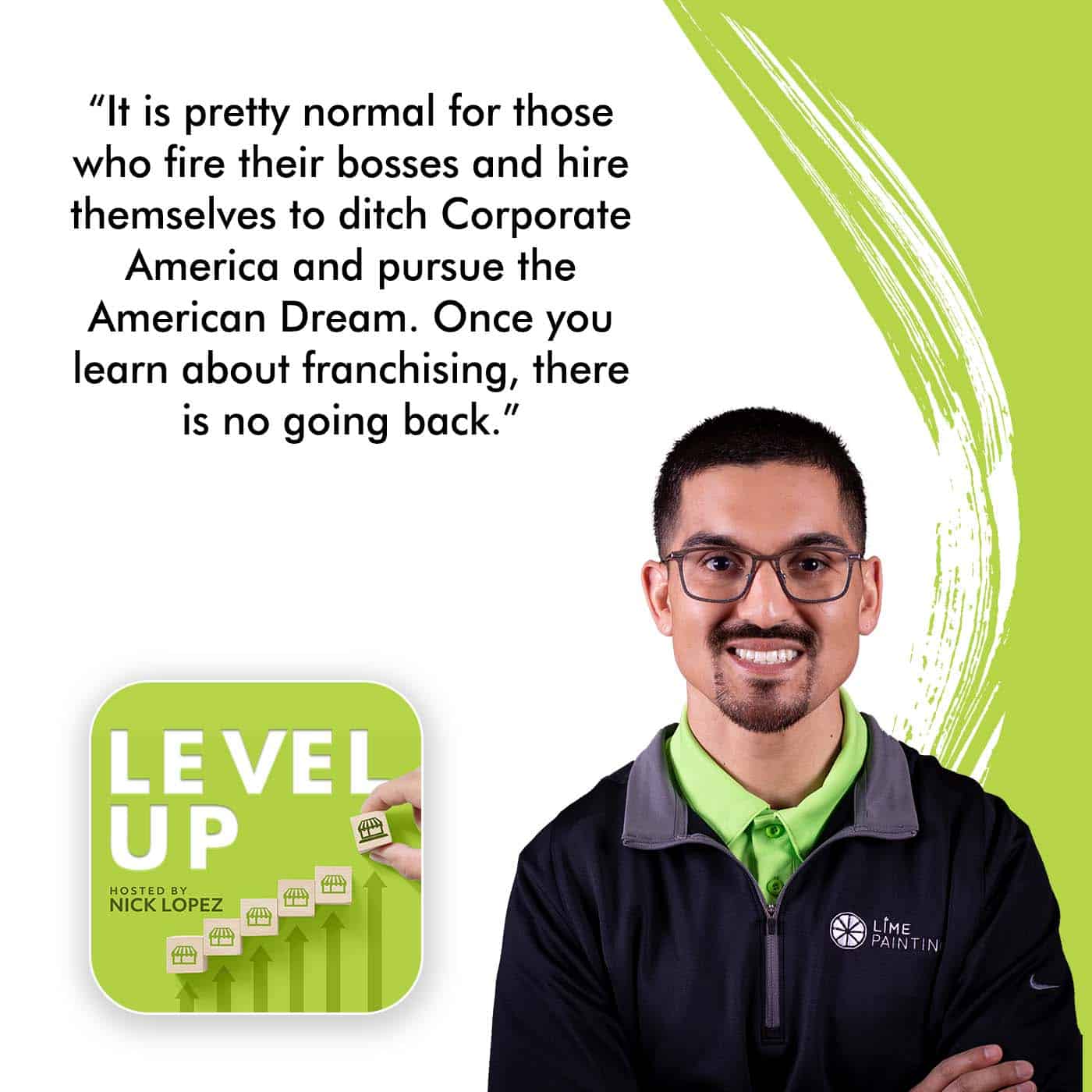
Most Rewarding Component
Many times, folks do not take action. You can look above the forest. If it becomes a little bit more normal, you can have a little bit more fun with it, frankly probably even shape your future more intentionally, and ultimately execute more clearly at a higher level. It is such an amazing process. When I was saying thank you for the incredible work that you do, I genuinely meant it because I’ve been fortunate to be able to live it out as a franchisor, helping people get into business for themselves. You have done this. You have hired yourself. What has been the most rewarding component of being an entrepreneur?
Probably the flexibility that I have with everything. I’m my own boss. I don’t have to ask for time off. I know if I’m not doing my day-to-day, things are going to suffer down the road. You prepare for it. Even if I have to put in some of those extra hours, I know that it’s benefiting myself and my family. It is 100% worthwhile. I’m not there working for somebody else and benefiting their families. This is all on me.
There’s a lot more risk involved. I don’t have a regular paycheck every two weeks, so there’s a challenge there. Sometimes, it gets a little dicey at times. Once you build that up, and I’m seeing this since I’ve been doing this for a year and a half, you build up some momentum and then realize, “This is what I did wrong in the beginning. Let’s not do that again.” It takes time.
With franchisors like you, other consultants, and some of the groups that I’m involved in, we all collaborate and work on best practices. It’s that whole franchise system make-up where you’ve got those people or those cohorts to fall back on and see, “What did you do in this situation that worked? What did you do over here that didn’t work?” We work together and collaborate. We’re all part of the team with the same goal.
What does your spouse think of you being an entrepreneur?
She’s starting to embrace it even more than I am. I’ve had this mindset from the beginning. My dad was an entrepreneur. He was a general contractor. My wife was a teacher for twenty years. She thought she was pigeonholed into this one profession. She saw what I was doing and what I was thinking for Atlas Franchise Advisors and then was like, “This sounds really appealing. I could do that too.” I’m like, “100% you could.” It’s learning something new.
It’s so much more rewarding when it’s your own. When you’re in business for yourself, there is no better feeling than that, not having to roll to work on Monday morning and sit in a cubicle. Having that mindset is really good. She has adapted. She has taken on a lot of our social media stuff. She’s a cofounder. It has been great to work side by side with her.
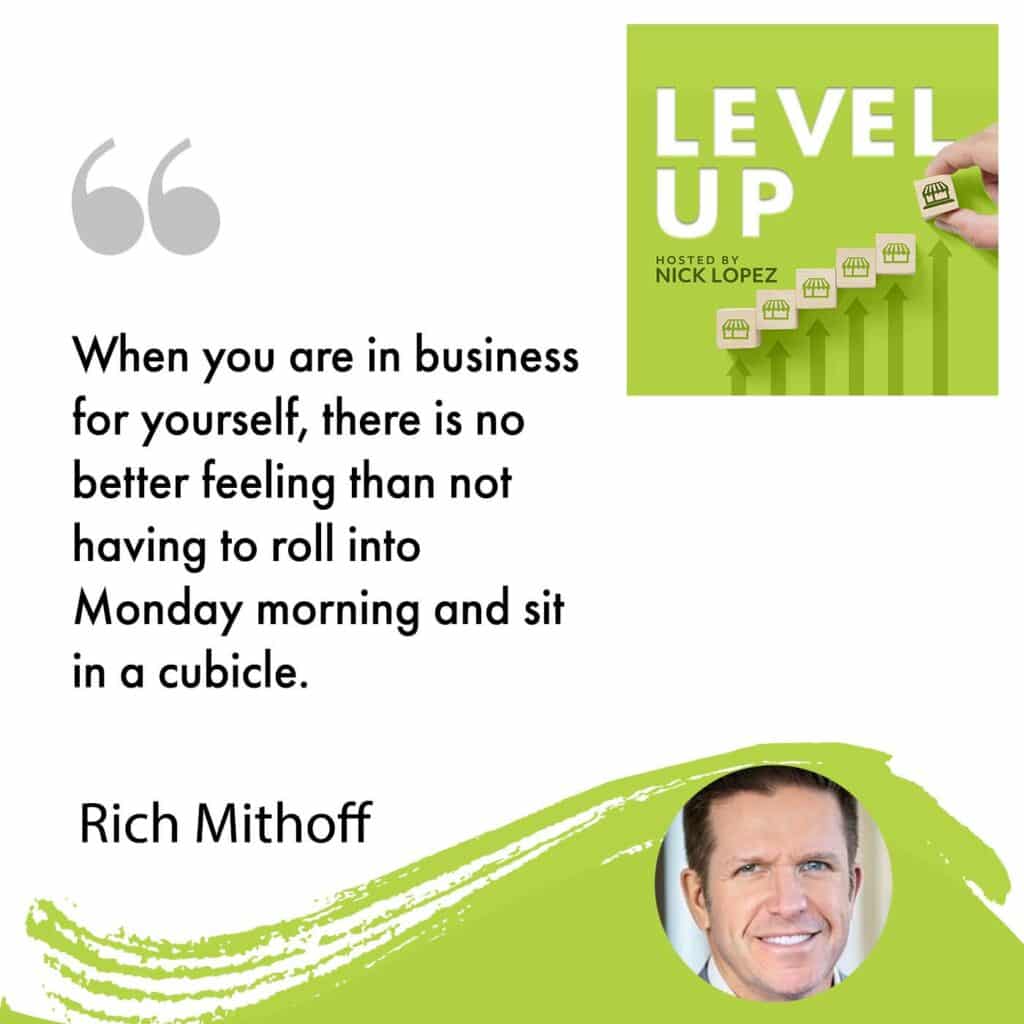
You are realizing the American dream together. A power couple.
I don’t know about that yet, but we’re working on it.
You’re doing it all for yourselves when you want and how you want.
Helping people succeed and invest in their own businesses and seeing their growth and their happiness is so rewarding.
I can see why franchising wooed you over. You fall in love with it. For myself, when I was in college, a mentor gave me a book. I learned about franchising, the model, the benefits of systems, roles, and working on the business, not in it. There are lots of ways to scale, but what I loved about the franchise model was the idea of being in business with other business owners.
I grew up a gym rat. I wrestled in college. I loved the locker room aspect. This whole element of pursuing goals together and winning and losing creates a unique bond. Franchising through the framework that is the franchise model creates incredible collaboration. That is the power of the franchise model and ultimately what I fell in love with.
Episode Wrap-up
Clearly, it has a way of causing you to run toward it once your eyes are open to it. You realize how you can accomplish the American dream of entrepreneurship through this special model which is franchising. When I learned about it, I was twenty years old in college. That was several years ago. I have been obsessed and in love with it ever since. It has been real. I appreciate your approach at Atlas, the amount of expertise that you bring, and your genuine heart toward making the right fits. That is clear as day. The folks that are working with you are truly fortunate. If anybody would like to get in touch with you, how can they do that?
That’d be great. I appreciate that. You can go to our website. It is www.AtlasFran.com. You can email me at Rich@AtlasFran.com or you can shoot me a text or ring my phone, (541) 321-0717.
I certainly had plenty of moments where I was inspired. It’s nice to have a conversation with a thought leader in franchising in high-performance business. Clearly, this is somebody who is doing it, is super talented, and has the unique advantage of his wife. That is a superpower most certainly. Thank you for everything that you do. I certainly leveled up as a result of this conversation. If you have as well, please subscribe to our show. It’s how we’re able to continue to grow and bring on thought leaders like Rich. Who knows? Maybe we will have the Mmes on some time. That would be fun. Like the episode and drop a comment down below. As always, level up.
Thanks a lot.
Important Links:
About Rich Mithoff
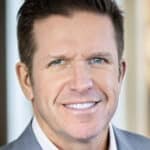
Rich Mithoff is a Certified Franchise Consultant dedicated to empowering aspiring entrepreneurs, investors, executives, and corporate refugees to achieve business ownership and success.
With over 20 years of experience in the franchising industry, Rich has a keen understanding of demographics and market trends, which he uses to help clients find ideal franchise opportunities that align with their goals, budget, and lifestyle.
His passion for franchising shine through his commitment to guiding clients towards entrepreneurial freedom. His personalized approach ensures that each client finds the right fit, maximizing their potential for success.
Rich’s services are completely free to clients, as he is compensated by the franchises he partners with. This unique model allows aspiring franchisees to benefit from his vast knowledge and experience without any upfront costs. Whether you’re looking to start or expand your business ownership journey, Rich is dedicated to helping you navigate the franchise landscape and achieve your dreams.
